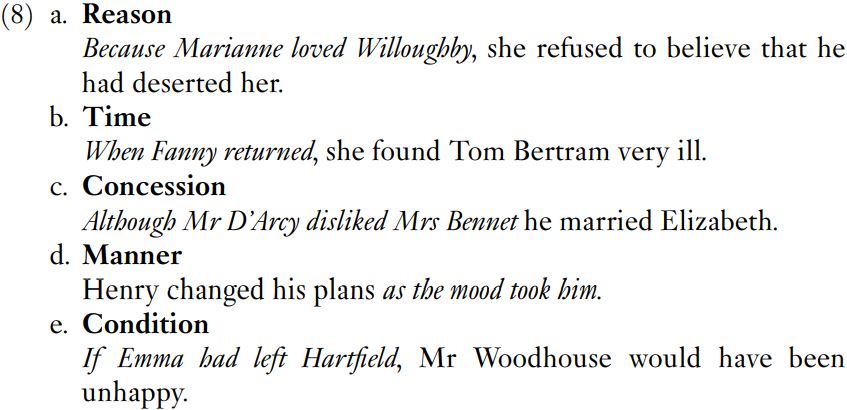

Grammar


Tenses


Present

Present Simple

Present Continuous

Present Perfect

Present Perfect Continuous


Past

Past Simple

Past Continuous

Past Perfect

Past Perfect Continuous


Future

Future Simple

Future Continuous

Future Perfect

Future Perfect Continuous


Parts Of Speech


Nouns

Countable and uncountable nouns

Verbal nouns

Singular and Plural nouns

Proper nouns

Nouns gender

Nouns definition

Concrete nouns

Abstract nouns

Common nouns

Collective nouns

Definition Of Nouns

Animate and Inanimate nouns

Nouns


Verbs

Stative and dynamic verbs

Finite and nonfinite verbs

To be verbs

Transitive and intransitive verbs

Auxiliary verbs

Modal verbs

Regular and irregular verbs

Action verbs

Verbs


Adverbs

Relative adverbs

Interrogative adverbs

Adverbs of time

Adverbs of place

Adverbs of reason

Adverbs of quantity

Adverbs of manner

Adverbs of frequency

Adverbs of affirmation

Adverbs


Adjectives

Quantitative adjective

Proper adjective

Possessive adjective

Numeral adjective

Interrogative adjective

Distributive adjective

Descriptive adjective

Demonstrative adjective


Pronouns

Subject pronoun

Relative pronoun

Reflexive pronoun

Reciprocal pronoun

Possessive pronoun

Personal pronoun

Interrogative pronoun

Indefinite pronoun

Emphatic pronoun

Distributive pronoun

Demonstrative pronoun

Pronouns


Pre Position


Preposition by function

Time preposition

Reason preposition

Possession preposition

Place preposition

Phrases preposition

Origin preposition

Measure preposition

Direction preposition

Contrast preposition

Agent preposition


Preposition by construction

Simple preposition

Phrase preposition

Double preposition

Compound preposition

prepositions


Conjunctions

Subordinating conjunction

Correlative conjunction

Coordinating conjunction

Conjunctive adverbs

conjunctions


Interjections

Express calling interjection

Phrases

Sentences


Grammar Rules

Passive and Active

Preference

Requests and offers

wishes

Be used to

Some and any

Could have done

Describing people

Giving advices

Possession

Comparative and superlative

Giving Reason

Making Suggestions

Apologizing

Forming questions

Since and for

Directions

Obligation

Adverbials

invitation

Articles

Imaginary condition

Zero conditional

First conditional

Second conditional

Third conditional

Reported speech

Demonstratives

Determiners


Linguistics

Phonetics

Phonology

Linguistics fields

Syntax

Morphology

Semantics

pragmatics

History

Writing

Grammar

Phonetics and Phonology

Semiotics


Reading Comprehension

Elementary

Intermediate

Advanced


Teaching Methods

Teaching Strategies

Assessment
Adverbial clauses
المؤلف:
Jim Miller
المصدر:
An Introduction to English Syntax
الجزء والصفحة:
65-6
1-2-2022
1579
Adverbial clauses
The name ‘adverbial’ suggests that adverbial clauses modify verbs; but they modify whole clauses, as shown by the examples in (8). Their other key property is that they are adjuncts, since they are typically optional constituents in sentences. They are traditionally classified according to their meaning, for example adverbial clauses of reason, time, concession, manner or condition, as illustrated below.
 The adverbial clause of reason in (8a), Because Marianne loved Willoughby, gives the reason (or the writer uses it to give the reason) why Marianne refused to believe that Willoughby had gone. It modifies the main clause she refused to believe that he had deserted her.
The adverbial clause of reason in (8a), Because Marianne loved Willoughby, gives the reason (or the writer uses it to give the reason) why Marianne refused to believe that Willoughby had gone. It modifies the main clause she refused to believe that he had deserted her.
The adverbial clause of time in (8b), When Fanny returned, gives the time at which another event happened, namely her finding Tom Bertram ill. It modifies the main clause she found Tom Bertram very ill.
The adverbial clause of concession in (8c), Although Mr D’Arcy disliked Mrs Bennet, conveys a concession. The writer says, as it were, ‘OK. I concede that he didn’t like Mrs Bennet. Nonetheless he married Elizabeth.’ The adverbial clause modifies the main clause he married Elizabeth.
The adverbial clause of manner in (8d), as the mood took him, describes the manner in which Henry changed his plans and modifies the main clause Henry changed his plans.
In (8e), the adverbial clause of condition If Emma had left Hartfield conveys the circumstances or conditions under which a particular situation would have arisen. The situation is Mr Woodhouse being unhappy, and the writer declares that this situation did not actually come about but would have done; Emma’s leaving Hartfield would have brought it about. The crucial fact is the relationship between the two situations; Mr Woodhouse’s being unhappy is conditional upon Emma’s leaving Hartfield. The adverbial clause of condition modifies the main clause Mr Woodhouse would have been unhappy.
 الاكثر قراءة في Syntax
الاكثر قراءة في Syntax
 اخر الاخبار
اخر الاخبار
اخبار العتبة العباسية المقدسة

الآخبار الصحية















 قسم الشؤون الفكرية يصدر كتاباً يوثق تاريخ السدانة في العتبة العباسية المقدسة
قسم الشؤون الفكرية يصدر كتاباً يوثق تاريخ السدانة في العتبة العباسية المقدسة "المهمة".. إصدار قصصي يوثّق القصص الفائزة في مسابقة فتوى الدفاع المقدسة للقصة القصيرة
"المهمة".. إصدار قصصي يوثّق القصص الفائزة في مسابقة فتوى الدفاع المقدسة للقصة القصيرة (نوافذ).. إصدار أدبي يوثق القصص الفائزة في مسابقة الإمام العسكري (عليه السلام)
(نوافذ).. إصدار أدبي يوثق القصص الفائزة في مسابقة الإمام العسكري (عليه السلام)


















